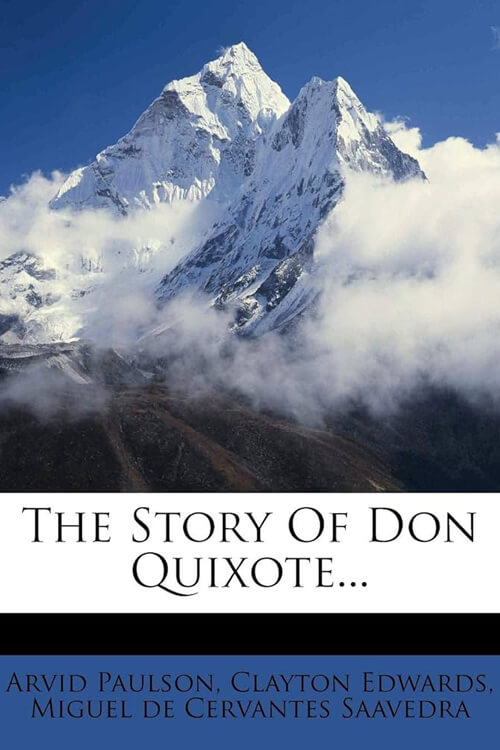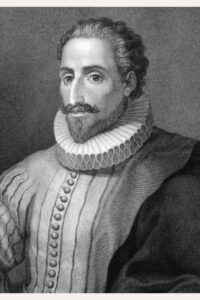
The Story of Don Quixote
In his younger days, he was a great sportsman and used to get up before the sun to follow his favorite pursuits of hunting and hawking, but as he grew older he spent almost all his time reading books on chivalry and knighthood with which his library was stocked; and at last he grew so fond of these books that he forgot to follow the hounds or even to look after his property, but spent all his time in his library, mulling over the famous deeds and love affairs of knights who conquered dragons and vanquished wicked enchanters.
At the time when Quesada lived, Spain was saturated with this sort of literature, and everybody wasted much time reading books that had no merit or value of any kind and which were full of the most ridiculous and impossible adventures. On the whole, they were the most utter rubbish that it was possible to print. They told about impossible deeds in the most impossible language and were filled with ambitious sentences that meant nothing under the sun. Señor Quesada spent hours racking his brains to puzzle out the meaning of something like this:
“The reason of the unreason with which my reason is afflicted so weakens my reason that with reason I murmur at your beauty.”
Or again:
“The high heavens that of your divinity divinely fortify you with the stars, render you deserving of the desert your greatness deserves.”
Poor Señor Quesada could not understand these sentences. Who could? No man in his right mind certainly, would have taken a madman to read any real meaning into them. And he wasted so much time in puzzling over them that at last he became quite mad and the words in the books would appear on the walls of his room, written in letters of fire, with so bright a light that they prevented him from sleeping. From trying to read a meaning into things that had no meaning whatever, Señor Quesada was mad—as mad as the books he had been reading.
Señor Quesada lived with his niece and his housekeeper, both sensible women who loved him and who were much grieved over the havoc his books of chivalry had worked with his senses. They believed that talking about these books made the old gentleman worse, so they refused to answer him when he argued about knights and dragons and whether this fair lady was
Read or download Book
Arvid Paulson (Author), Clayton Edwards (Author), Miguel de Cervantes Saavedra (Creator)
Miguel de Cervantes Saavedra (29 September 1547 – 22 April 1616) was an Early Modern Spanish writer widely regarded as the greatest writer in the Spanish language and one of the world’s pre-eminent novelists. He is best known for his novel Don Quixote, a work often cited as both the first modern novel and “the first great novel of world literature”. A 2002 poll of 100 well-known authors[b] voted it the “most meaningful book of all time” from among the “best and most central works in world literature”.
Much of his life was spent in relative poverty and obscurity, which led to many of his early works being lost. Despite this, his influence and literary contribution are reflected by the fact that Spanish is often referred to as “the language of Cervantes”.
In 1569, Cervantes was forced to leave Spain and move to Rome, where he worked in the household of a cardinal. In 1570, he enlisted in a Spanish Navy infantry regiment and was badly wounded at the Battle of Lepanto in October 1571 and lost the use of his left arm and hand. He served as a soldier until 1575 when he was captured by Barbary pirates; after five years in captivity, he was ransomed and returned to Madrid.
His first significant novel, titled La Galatea, was published in 1585, but he continued to work as a purchasing agent, and later as a government tax collector. Part One of Don Quixote was published in 1605, and Part Two in 1615. Other works include the 12 Novelas ejemplares (Exemplary Novels); a long poem, the Viaje del Parnaso (Journey to Parnassus); and Ocho comedias y ocho entremeses (Eight Plays and Eight Interludes). The novel Los trabajos de Persiles y Sigismunda (The Travails of Persiles and Sigismunda), was published posthumously in 1616.
Biography
Despite his subsequent renown, much of Cervantes’ life is uncertain, including his name, background, and what he looked like. Although he signed himself Cervantes, his printers used Cervantes, which became the common form. In later life, Cervantes used Saavedra, the name of a distant relative, rather than the more usual Cortinas, after his mother. But historian Luce López-Baralt claimed that it comes from the word Shailendra in Arabic dialect means “one-handed”, his nickname during his captivity.
Another area of dispute is his religious background. It has been suggested that not only Cervantes’s father but also his mother may have been New Christians. Anthony Cascardi writes, “While the family might have had some claim to nobility they often found themselves in financial straits. Moreover, they may have been of converso origin, that is, converts to Catholicism of Jewish ancestry. In the Spain of Cervantes’s days, this meant living under clouds of official suspicion and social mistrust, with far more limited opportunities than were enjoyed by members of the ‘Old Christian’ caste.” According to Charles D. Presberg, there is no wide following for the view that Cervantes had converso origins. Cuban writer Roberto Echevarría asserts that the claims of Cervantes’ converso origins are based on “very flimsy evidence”, namely Cervantes’ lack of social and financial progression in a time when such rewards were denied to most Spaniards regardless of a social group.
It is generally accepted Miguel de Cervantes was born around 29 September 1547, in Alcalá de Henares. He was the second son of barber-surgeon Rodrigo de Cervantes and his wife, Leonor de Cortinas (c. 1520–1593). Rodrigo came from Córdoba, Andalusia, where his father Juan de Cervantes was an influential lawyer.






